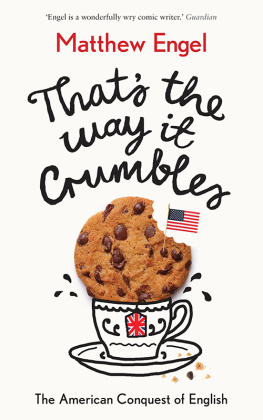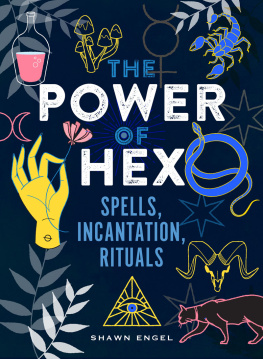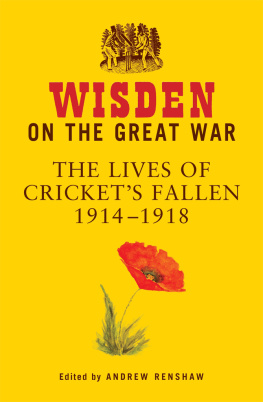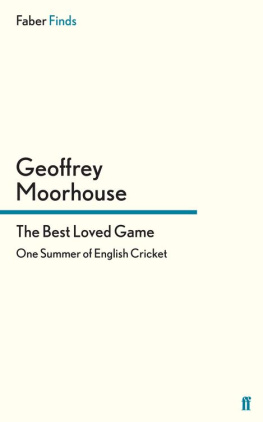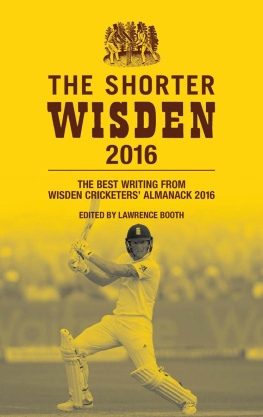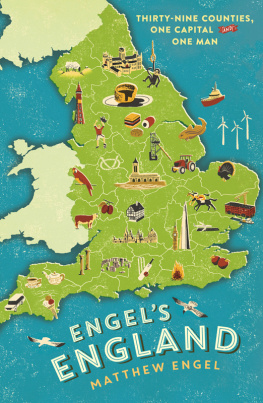Thats the way it Crumbles
MATTHEW ENGEL is a journalist and author. He writes regularly for the Guardian and Financial Times, among other publications, and was the editor of the Wisden Cricketers Almanack for twelve years. He is also a baseball enthusiast. His books include Eleven Minutes Late: A Train Journey to the Soul of Britain, Extracts from the Red Notebooks and Engels England: Thirty-nine Counties, One Capital and One Man (Profile, 2014).
Matthew Engel
Thats the way it Crumbles
The American Conquest of English

First published in Great Britain in 2017 by
PROFILE BOOKS LTD
3 Holford Yard
Bevin Way
London
WC1X 9HD
www.profilebooks.com
Copyright Matthew Engel, 2017
The moral right of the author has been asserted.
All rights reserved. Without limiting the rights under copyright reserved above, no part of this publication may be reproduced, stored or introduced into a retrieval system, or transmitted, in any form or by any means (electronic, mechanical, photocopying, recording or otherwise), without the prior written permission of both the copyright owner and the publisher of this book.
A CIP catalogue record for this book is available from the British Library.
eISBN 978 1 78283 262 1
To HILARY, who for Christmas 2016 bought me a jar marked Cookies,
and to MARILYN, who after forty-four years in Britain nearly always remembers to say to-mah-to.
A NOTE ON THE TEXT
Beyond living memory and before recording devices, it is not at all certain how people spoke and what words they used. The written language is only a guide. I have tried in this book to work out when, how and why American words might have entered the British vocabulary. This is an art not a science. And there will be honest errors. But I am certain that any words I have mistakenly categorised as American will be more than cancelled out by the Americanisms I have omitted.
I would be delighted to receive politely worded suggestions for amendments and additions at . Where appropriate, changes will be made in any subsequent editions.
In the text, words and phrases that went into common British use that I believe to have been minted in America are in bold italics. Words that originated in Britain and were then re-imported from the US are marked in bold italics with a . OED stands for the Oxford English Dictionary.
Thats the way the cookie crumbles and the ball bounces.
Lew Burdette, Milwaukee Braves baseball pitcher, after his team lost the 1958 World Series to the New York Yankees.
Fran (Shirley MacLaine): Why cant I ever fall in love with somebody nice like you?
Bud (Jack Lemmon): Yeah, well. Thats the way it crumbles. Cookie-wise.
The Apartment, directed by Billy Wilder, 1960.
INTRODUCTION
THERELL BE BLUEBIRDS
In 1942 Vera Lynn, the Forces Sweetheart, recorded a song including the refrain that, perhaps more than anything else, summed up the British attitude to the Second World War:
Therell be bluebirds over
The white cliffs of Dover
Tomorrow
Just you wait and see.
Those fifteen words said it all: this horror would not last for ever; Britain would just have to keep a stiff upper lip and it would soon be over. The air would no longer be filled with Spitfires and Messerschmitts, and the characteristic sights and sounds of the English summer skies would return. Thats what we were fighting for.
Lynns popularity, cemented by other hits like Well Meet Again, was almost universal. As one historian of war songs put it, her lyrics would articulate fairly basic emotions for those unused to expressing emotions of any sort. That was an important service to a nation with a stiff-upper-lip epidemic.
There were some dissenters, however. For a start, there was my father, Flight Lieutenant Max Engel, who couldnt stand the sound of her voice: She ruined my war, he would say. More influentially, but just as unsuccessfully, some of the top brass in both the BBC and the Army thought she was bad for morale. The corporations controller of programmes called for waltzes, marches and cheerful music with more virile lyrics and the elimination of crooning, sentimental numbers, drivelling words, slush, innuendoes and so on.
And then there were the ornithologists, whose successors wince to this day whenever they hear that opening line. The bluebird is an American bird, a kind of thrush, found in three different forms across the United States. There never were any bluebirds over Dover or anywhere else in Britain, before or after 1942. Not one, ever.
It is a well-loved bird in the US, among the smaller percentage of the population which cares about such matters there: the bluebird kills a lot of pests in gardens, and culturally has a longstanding association with good times (the Bluebird of Happiness, Mr Bluebirds on my shoulder, Im always chasing rainbows, waiting to find a little bluebird in vain).
How then did such a palpably alien symbol become the embodiment of Britains wartime spirit? John McEwen, The Oldies ornithological columnist, has tried to argue that Lynn was right: swallows, Britains bluest bird after the kingfisher, often gather for a pre-migratory party over the Kent coast, and that they constitute blue birds, if not exactly bluebirds. Others have tried to find a connection to the blue uniforms of the RAF.
The most convincing explanation came from the singer herself, in her long and revered old age as Dame Vera. Its American, she said in 2007, just after her 90th birthday. You dont get bluebirds over here, do you? Her tone, according to The Times, was apologetic. The composer, Walter Kent, first saw the white cliffs nearly fifty years after he wrote the song; the lyricist, Nat Burton, who died young, almost certainly never saw them at all.
Does any of this actually matter? There is such a thing as artistic licence, after all. And we all make mistakes. On their own, those lyrics would merely be an obscure curiosity. But the bluebirds have to be seen as part of an invading force that proved far more effective than the Luftwaffe. Largely unseen, unending, seemingly unstoppable. The American language.
***
The history of the two major strands of English British and American now falls into two equal parts. British settlers arrived on the American continent in the early seventeenth century: the best-known group, the Pilgrim Fathers, reached Massachusetts in 1620. The British prevailed against all comers and ensured that the new-found land would become first a British colony and then an English-speaking independent nation. For the first 200 years these Americans took the language they brought with them and shaped it to their own ends.
And then, round about 1820, they began exporting the words they had themselves created, or retained in stock long after the British had made the words redundant. The Americans did not foist their language on Britain; the British found it useful, attractive or both. This process sped up as America outstripped in population and power what was once the mother country. In 1928 a single technological advance increased the speed of travel exponentially, and the process continued rapidly after peace returned to the white cliffs.
Now, as we approach 2020, the American words the British invited into their homes are in danger of taking over. And it has become possible to imagine a time 2120 would be a plausible and arithmetically neat guesstimate when American English absorbs the British version completely. The child will have eaten its mother, but only because the mother insisted. This book is an attempt, feeble though it might be, to try to ensure that prediction does not come true.
Next page
